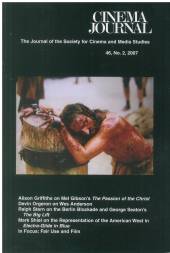The topic of this article may not meet Wikipedia's general notability guideline .(August 2024) |
 | |
| Discipline | Film studies, television studies |
|---|---|
| Language | English |
| Edited by |
|
| Publication details | |
Former names | Cinema Journal The Journal of the Society of Cinematologists |
| History | 1961–present |
| Publisher | University of Michigan Press (United States) |
| Frequency | 5 issues annually |
| Standard abbreviations | |
| ISO 4 | J. Cine. Media Stud. |
| Indexing | |
| ISSN | 0009-7101 (print) 1527-2087 (web) |
| LCCN | 75649099 |
| JSTOR | 00097101 |
| OCLC no. | 02244743 |
| Links | |
| |
The Journal of Cinema and Media Studies (formerly Cinema Journal and The Journal of the Society of Cinematologists) is the official academic journal of the Society for Cinema and Media Studies (formerly the Society for Cinema Studies). It covers film studies, television studies, media studies, visual arts, cultural studies, film and media history, and moving image studies and is published by the University of Michigan Press.